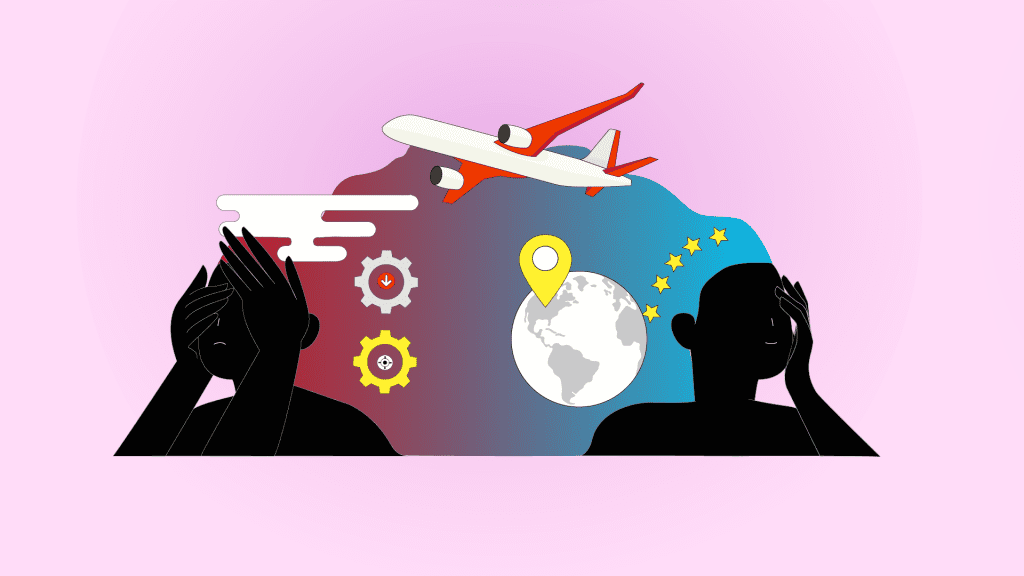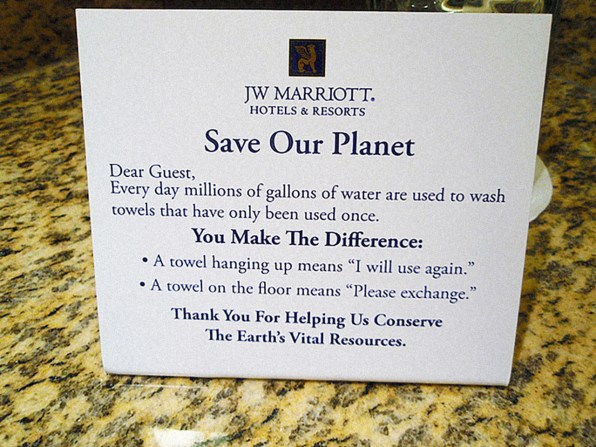Skift Take
Skift coined the term "permanxiety" in 2017 to describe how social, political, and climate turmoil is coloring consumer expectations, including for travel. Permanxiety has only been compounded since on the heels of war and a pandemic. Travel companies need to make sure newly upbeat services and messages aren't out of sync with the gloomy mood music in many travelers' heads.

Megatrends 2023
Discover the top trends that will define the travel industry for the coming year.
Travel has always offered an escape from the ordinary. But it has classically offered escapism by creating what you might call “sensory deprivation bubbles.” It conjured the fantasy that troubles didn’t exist within the space of their resorts, cruise ships, theme parks, and first-class cabins.
The pandemic poked holes in that approach, forcing the travel sector to acknowledge it with masks, safety protocols, and service disruptions even in the most secluded of its hideaways. Industry leaders were surprised to discover that most travelers welcomed companies acknowledging the alarming reality. Even though everyone wished things were otherwise, outright denial would have been wrong.
Some travel executives are now extrapolating that lesson to apply to how they address the pervasive worries many consumers have on multiple fronts today.
Skift coined the term “permanxiety” in 2017 to describe how social, political, and climate turmoil is coloring consumer expectations of everything, including travel. We noted at the time that “travelers endure a barrage of worries about terrorism, security, neo-isolationism, racial tension, Trumpism, technology and its adverse role, the widening economic gap, culture wars, climate change, and other geopolitical and local issues.”
Since then, the list of worries has lengthened to include rising inflation, a war in Ukraine, and troubles in China, the world’s second-largest economy.
“This is the most complex, disparate, and cross-cutting set of challenges that I can remember in the 40 years that I have been paying attention to such things,” said Lawrence Summers, former U.S Treasury secretary and former president of Harvard, in a recent talk.
Problems like these reach “crisis” proportions when their size and interconnectedness overwhelm people’s confidence that they can cope. Many of today’s problems look so intractable that they can feel “permanent.” Bank of America has a running tracker of the top worries on investment manager minds, and a review of the past decade’s top worries shows that several concerns, such as populist autocrats causing societal upheaval and inflation causing recessions, actually did happen. When bad things keep happening, it can raise people’s nervousness.
For the travel sector, permanxiety provides an opportunity for travel companies to help alleviate travelers’ concerns by finding subtle ways of recognizing this intense cultural moment globally. It would probably be a mistake for the travel industry to go too far and cast itself as a hero in the story by trying to rescue people from their permanxieties. Instead, there’s a modest, in-between option: Travel brands can move away from their traditional role of wholly repressing troubles to subtly reassuring guests that they’re not alone in their worries.
Popular psychology provides one clue to the travel sector about how to handle permanxiety. As a general rule, individuals who repress their fears face worse outcomes. The lesson for the travel industry may be to find subtle ways to acknowledge the permacrisis, showing guests that they’re not alone. To quote the proverbial saying, a trouble shared is halved.
Humor is one method. Online travel company Kayak ran a series of ads in the U.S. in a campaign about so-called “Kayak Deniers.” Characters in the ads engage in arguments with relatives or friends who heatedly deny that Kayak is a source of good deals.
“We have to take some risks with our creative, and we’re only running this in the U.S.,” said Kayak CEO Steve Hafner. “It taps into the little zeitgeist of the moment, which is, we’ve got a pretty divided country. So we’re trying to bring a bit of levity to that.”
In 2022, Kimpton’s sentiment analysis detected a rise in anxiety among travelers relative to historical averages. So it offered nearly 1,000 of its guests free access to a video-therapy session with teletherapy experts.
“We’re there for our guests for some of their most important and emotional moments, and our employees take this responsibility very seriously,” said Kathleen Reidenbach, Kimpton’s chief commercial officer. “We’ve worked hard for employees to understand our ethos and that we prioritize emotional brand standards over physical brand standards.”
Wellness in an Age of Permanxiety
Offering relevant products is another way to respond to permanxiety. Take wellness offerings for example. The menu of offerings that hotels, resorts, and cruise lines provide might need to shift in emphasis during an era of permanxiety.
To explain why, consider the analogy of psychologist Abraham Maslow’s concept of the “hierarchy of needs,” where essentially humans must meet basic concerns, such as food and safety, before they can concentrate on higher-level issues, such as developing their personalities and social relations. Similarly, when a permacrisis is sounding daily alarms in every person’s smartphone, many people will seek basic comforts first, rather than higher-level “self-actualization.”
In that context, massage and meditation may have more appeal as wellness offerings than usual. Coaching-type experiences where guests try to become better people or actualize unexplored parts of themselves, whether it’s through spiritual counseling or ceramics classes, might not resonate as well today as they did in the past, said Skift Research Senior Analyst Seth Borko.

It’s probably not accidental that activities like pickleball and ax throwing have blossomed as modes of stress relief during a time of perma-crisis. The games have simplified rules and reduced physical demands, making them appeal to a variety of demographics. Many hoteliers and cruise lines are racing to add facilities for these activities.
Companies that address the perma-crisis in substantive ways rather than through gestures may generate dividends, too. On climate change, many travel executives bemoan that consumers refuse to pay for more sustainable offerings. That belief is partly true, but it overlooks the fact that the travel industry hasn’t offered many serious sustainable offerings to date. Consumers are right to be skeptical about the value of many carbon offsets, for example, or whether a hotelier’s motivation for reducing housekeeping service is more about profit than the planet Earth.
If travel companies took carbon reduction more seriously, consumers might respond. To relief their permanxiety, travelers may gravitate toward companies that can actually point to having achieved independently certified reductions in their carbon emissions compared to other brands. Resorts, for example, that explain they’ve reduced water pressure in bathroom showers to preserve local water supplies in response to the climate crisis may help guests feel some relief in their permanxiety. At least something is being done to try to address the crisis.
In business travel, green brands may have more appeal, given the activist investor pressure on many companies to take steps to de-carbonize. A travel company that can show in a certified way it has reduced its energy consumption and supply chain provides a large potential reward in good marketing karma. Enabling a frequent road warrior to lower their carbon footprint, for example, could help provide comfort to that business traveler with psychological relief that they can take some personal action in the face of a system-wide problem. It may instill brand loyalty.
Worker Training as a Lever
To be sure, workers in the travel industry also face permanxiety. Some travel companies are choosing to acknowledge their employees’ apprehensiveness rather than ignore it, becoming more porous to what’s happening in the “outside world,” so to speak. It makes sense that workers who feel their companies are addressing some of their permanxiety may be better able to help travelers, in turn, feel some relief from their own permanxiety.
At hotels, many housekeepers worry about their safety when working alone in guest rooms. So more hotel companies are installing panic buttons, rather than pretending that nothing ever goes wrong.
After the U.S. national racial reckoning after George Floyd’s death in 2020, travel companies increased their diversity, equity, and inclusion initiatives. Some efforts aim at making higher-level employment as airplane pilots or hotel owners more realizable for early-career staff. Tourism Diversity Matters, founded by Mike Gamble, CEO of SearchWide Global, and chaired by Elliott Ferguson, CEO of Destination DC, launched in 2021 as a resource to help tourism officials achieve their equity ambitions, such as by launching an apprenticeship program.
The thing with permanxiety is that it’s hard to shake off. But the travel industry excels over many other verticals in being empathetically fine-tuned to the needs of its customers and to being innovative in finding ways to address these needs. Perhaps no other industry faces as much of an opportunity to bond with its today’s customers.
The Daily Newsletter
Our daily coverage of the global travel industry. Written by editors and analysts from across Skift’s brands.
Tags: climate change, covid-19, megatrends 2023, permanxiety, Russia war

